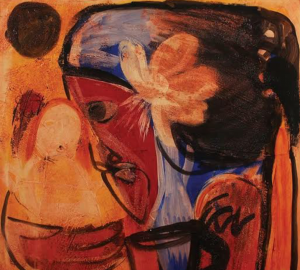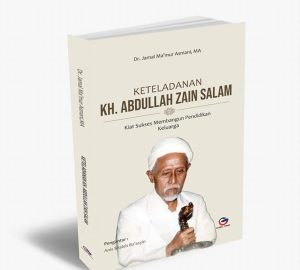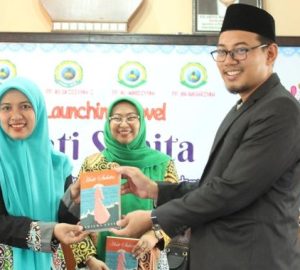Poetry is not merely about dusk, rain, or heart. Or hearts in the rainy twilight. Poetry also questions the bookkeeping event. The books look for the remaining space in between rain, dusk, and longing which increasingly feeds the universe of ‘modern’ poetry.
We refer to the poetry as a book from the eyes of the child and the mother. Intends to look at the events of the book from the most important space on earth: the family.
In the poem book entitled Ibu Mendulang Anak Berlari (2016) by Cyntha Hariadi, we encounter a portrait of the interaction between mother and child. In exemplary stories, mothers are often portrayed as angels. The reader is made to forget that the mother is also a human who is not only covered by patience. With children, they can also be angry:
Whatever happens between us every day / looking away, avoiding eye contact, mouth fighting / parrot tongue, pulling tendons, playing hands, slamming doors, broken plates / concussion walls, cracked floors, inserted pieces of hearts / broken from an explosion that drains the body // every night, / our bodies coincide again / our souls come together in a book.
The mother in Cyntha’s poem looks honest. As an I-lyric, there is a tired voice from her over what happened this afternoon. Mothers are annoyed by the orders the children don’t obey. Objects and breaking sounds filled the house. Mother and child are like two televisions that are tuned together. It’s just that they have a feeling of patience that is vulnerable to crumbling and two hands to clash.
What’s interesting about the poem above, Cyntha does not display the image of mothers (young) today. In the poem there is no gadget, the device that seems to have become a must-have item today. Perhaps the lyric knows, the device is indeed effective in making the house far from strife. Silent but insulated. So, even though he knew that tomorrow there would be noises again, he chose the book as a place of residence that did not alienate each other:
Eyes that still refuse to look at each other / finally get tired and close / both arms grab each other / forget what the fuss was about today.
We can imagine “Ibu Mendulang” a story that powers “Anak Berlari” in the image. When tired of wandering in the story, the child’s eyes close. His arms embraced his original body. Mother continues to follow the story. Her eyes might have been heavy, but he continued, while glancing at his sleeping son. When the story is over, then she closes the book. Clasped the body beside her. The body that he will continue to feel herself.
Books are terrain. The mother spreads the landscape on the child. But the field is not even distant. In books, the terrain is precisely where they run, mingle, and rest together. The bookkeeping event became an intimate event rather than alienating.
Likewise, the bookkeeping event written by Abinaya Ghina Jamela, a female poet born in 2009. Books are a territory that has never been completed. Mother made Naya continue to be passionate about wandering in a space that she knew would never end. Naya wrote in a poem:
Why do I / like to read? So that I can be as smart as mother. Mother becomes the beats of the book.
For a moment we remember the prominent Southeast Asian researcher, Benedict Anderson (1936-2015). In his memoir, Hidup di Luar Tempurung (2016), Ben tells the story that his parents made an unparalleled home library. “They also encourage us to get used to reading about the lives, experiences and thoughts of people who are from different languages, are in different classes and regions, and come from different historical periods,” Ben recalls.
Like later I-lyrics in the poetry of Cyntha and Naya, Ben’s bookkeeping avidly also initiated by his parents. The books that contained Ben’s childhood contained stories. That makes his childhood really full of stories. And humans, you know, are formed from stories. Maybe little Ben had never thought, but now we understand, looking at the intake of Ben’s childhood books, why he became a human who truly “lives outside the shell”.
The bookkeeping event teaches us that we are unwilling to be quiet in the shell. Reading is not a calming, freezing event. Sitting or lying down when reading doesn’t mean going nowhere and getting nothing. Reading is turbulent exploration. We absorb three lines of poetry that reflect biographical events reading Naya: I read books. / Books about the heart, the beat / like running horses.
The heart for Naya is not just an organ. Naya does not read the heart as a mere blood pumping organ. Heart also means the sound of the roar of a horse on a stretch of savanna. Starting from the internal organs of the body, Naya’s image flew to the field where the horses ran. There was the golden light of the afternoon sun, the breeze, the swish of the grass, and the sound of the roar of horse’s feet. Books carry imagination through spaces.
Reading a book often becomes an event full of unexpected. Unfortunately, childhood, or a time when agile imagination jumps, books are not often celebrated. It could be because from a home, books are considered like luxury goods. Or, perhaps, from another house, books are considered boring antiquity. After all, with such assumptions, books can still be found in the library.
This assumption leaves the imagination of the book at home. In fact, as said by Murti Bunanta (2008), libraries are indeed crammed with books, but not many can create bookkeeping events. Therefore, childhood is kept away from the amazing events of the book.
Perhaps that is why in the poem of the Surat Malam Untuk Paska (1999) Joko Pinurbo writes: childhood is the first chapter / a romance that is often missed and inseparable. In the poem, I compare his lyrics with you, who “wants to learn to read a word / who breaks himself into drops of rain / which is not overwhelming.”
The story in the book can actually be a marker in the course of human time that also tells the “first chapter”. How do the stories in the book first come to us and then we give meaning. That memory, at an increasingly mature age, is getting richer. And become a place to die when tired in an aging world.
Artikel ini juga tersedia dalam bahasa:
 Indonesian
Indonesian





